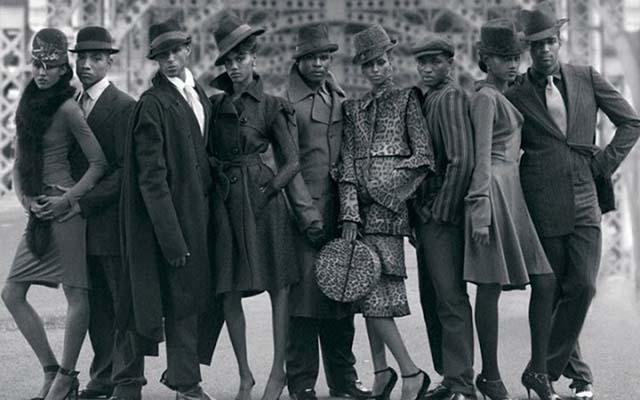Funny how we all do the same things in the end


IN RETROSPECT . . . Obsession with fashion and our struggles for excellence are not anything new as in the days old old, today’s fashion was once the in thing
David Mungoshi Shelling the Nuts
Things come and go and come again. We re-arrange and re-package the same things over and over again and life goes on with plenty of verve and excitement and we all discover new things that are not really new.
In some way life is art and art is life. Nowhere is this organic link more clearly illustrated than it is in music, poetry and creative literature in general. Lyrical poetry, for example, stands out because of its content and musicality. Its content can arouse such profound emotions as sorrow, happiness, loneliness and pain. It can make you do things you shouldn’t do and make you feel heroic about it. You become part of a one-person movie in which the script is written by you and externally directed by the forces that influence your actions. Not unexpectedly, you star in this movie! Take the case of the macabre Hungarian poem, ‘Gloomy Sunday’. A more or less obscure poet and an equally obscure musician combined to come up with one of the most hypnotic musical pieces of all time. Never mind how the song sent many to their untimely transitions into the afterlife!
I know of someone who, when faced with a hard decision to make, happened to hear a raspy Ngwaru Mapundu song whose lyrics when translated said something like: I heard them say that Esinidia was a witch/I didn’t care a hoot what they said/Because I loved her . . . The man went ahead and married the girl he had chosen. So music, like poetry, does move us from inertia to action.
To my mind one of the greatest rock bands of all time is group known as ‘The Rolling Stones’. For me one of their best songs ever is the hauntingly beautiful ‘As tears go by’. Its lyrics make an observation that is true for all time, in all places and at all times. Let’s take a moment to look at these lines from ‘As tears go by’:
It is the evening of the day
I sit and watch the children play
Doing things I used to do
They think are new . . .
Does that ring any bells? Remember how we used to rush out and play outside after a long downpour of rain? We played such games as ‘arawuru, kwenyekwenyebhaza’ and ‘touch’. And when we did, it never once occurred to us that our parents had, in their time, probably done exactly the same and played these very games. That’s the beauty of life and of experience. You experience each thing in complete novelty regardless of how many others before you or around you have gone through the very same experiences.
And so, life goes on — in repetitive cycles, and everything is always new to someone somewhere. So when daughters wear the skimpiest of miniskirts or some other avant garde outfit, the mothers are outraged. How quickly people forget. Just look into an old picture album and you will see. Six inch heels on exotic shoes, skirt well above the knees and legs in sheer stockings. Before pantyhose there was what people called a keza (corset). These things were followed by the maxi and the midi and wigs. And once again we see how experience like death is a leveller and how everybody is a lover of something or someone.
Do you remember Pond’s vanishing cream? That was how the indigenised English word ‘kuponza’ came into vogue. It aptly described how a girl or a woman ‘creamed’ her face so to speak and immediately joined the ranks of the sophisticated. There was so much more going on, and so much creativity too. Do you know what you can do with sugar and water besides concocting the drink called koro? Let me tell you. After a girl had scrubbed herself clean she smeared this sugary mix on her legs and they then shone from a distance.
There was no way she could fail to make heads turn as she walked to school wearing an artificial stiff petticoat made of starched paper. If you don’t know what a stiff petticoat is just imagine an open umbrella! It was the in-thing in its day and was such a fad that The Golden Rhythm Crooners of Bulawayo had a hit song in praise of this wondrous item. A song about ‘high’ society girls on a Saturday afternoon clad in high heels and stiff petticoats, the sleeves of their dainty cardigans slightly rolled up. These good time girls walked on air, metaphorically speaking, their entranced faces looking up at the stars in daylight. They were stars of a sort.
So you see, obsession with fashion and our struggles for excellence are not anything new. Young ones these days speak of bling and swag as if they have just been invented. Things come and go and come again. We re-arrange and re-package the same things over and over again and life goes on with plenty of verve and excitement and we all discover new things that are not really new.
Even the sagging trousers thing is not new. In those far away days when we smoked imitation pipes fashioned from unwanted pieces of wood in carpentry lessons we let our shorts sag as soon as we were out of sight where no adults could see us. And of course we did the bump. That walk that says you’re the main man and nobody should treat you any other way. It is enlightening watching today’s children doing things we used to do that they think are new.
You can extend recycled things to even the area of words, vocabulary and conversation. Words like ‘bhebhi’ have refused to go away and stayed the course to this day. When Jah Prayzah says, ‘Tirihevhihevhi’ he is probably not aware that ‘hevhi’ (heavy) is a recycled word and that as far back as the mid-1950s, it was not uncommon to hear someone talk about a heavy shoe, dress or jacket and so on. You could even say your girlfriend or boyfriend belonged to the heavy brigade (Ndewekwahevhi). This had the same meaning and effect as calling someone or something a ‘can’t-get’. It is easy to see why some sage said there is nothing new under God’s heaven. In a twisted kind of glasnost we can say that everything happening happened. Even the new things have all happened before! Therefore, our current fixation with the Internet for example, is perhaps no more than just an enhancement of a previous fixation.
Where many today are couch potatoes obsessed with processed material such as that offered on TV, what used to be was that nearly everyone going to school became a bookworm of sorts. Yes, you guessed it! That thing that many a poor teacher tried to banish — the comic, took root among many young urban people (long before we could speak of black Zimbabwean yuppies). There were so many comics everywhere. Cowboy stories featuring Buffalo Bill, the Lone Ranger and Tonto, Davy Crockett and other wild west characters were usually one’s first experience with comics (if you were a boy). You soon moved on to war comics all about the Second World War and you learned words like achtung in German and banzai in Japanese.
You glorified guns and took sides, invariably empathising with the apparent victors. No-one identified with the victims. Soon there was a revolution. You graduated from the violent stuff to what we called ‘love comics’ and began to notice the opposite sex. And the hippies said, make love not war.
Young people are crazy about WhatsApp and Facebook. Perhaps understandably so, because these forums give them a kind of poetic licence. They take liberties with convention. Spelling and grammar don’t matter so much here. It’s the writing and the presence that matters.
Everyone is writing something and everyone is blowing their own trumpet. This frenetic activity is reminiscent of the love letters we used to write: masterpieces with strange addresses like ‘The Dreamland of Love/P.O. Box Sweet Kisses/Paradise forever’ etc.
These creations were quite ingenious considering that none of us knew what we were talking about. So fantasy is always with us, as it was in the beginning and ever shall be, world without end . . . There are templates for everything, and we do what everyone is doing.
There are so many familiar things we file away and with time even forget. Such perennial themes as the gender divide and the conflict between mothers and the wives of their sons are things that seem to happen again and again. In his inimitable style, Arthur Chipunza the composer and performer of the iconic Mvura Ngainaye song with The St Paul’s Musami Band did another song in which his persona laments his foolishness in causing his loved one to forsake him all because he had allowed himself to accept as gospel truth the biased views of his friends who said women were no good as if he himself was not the son of a mother.
We had lots of photos taken. Now it’s selfies! Déjà vu?








Comments